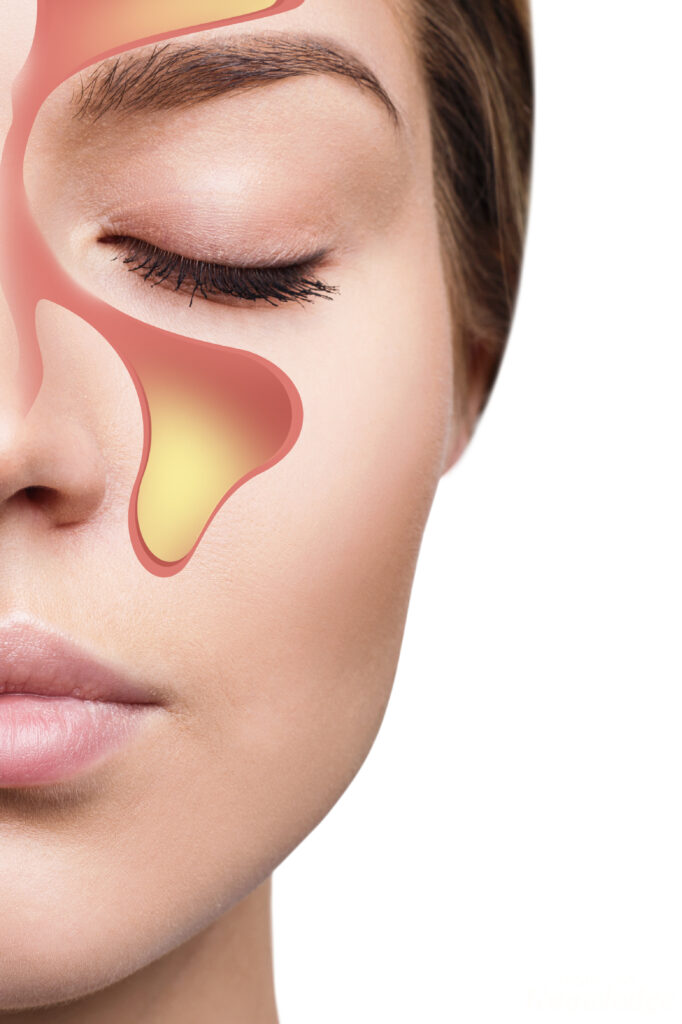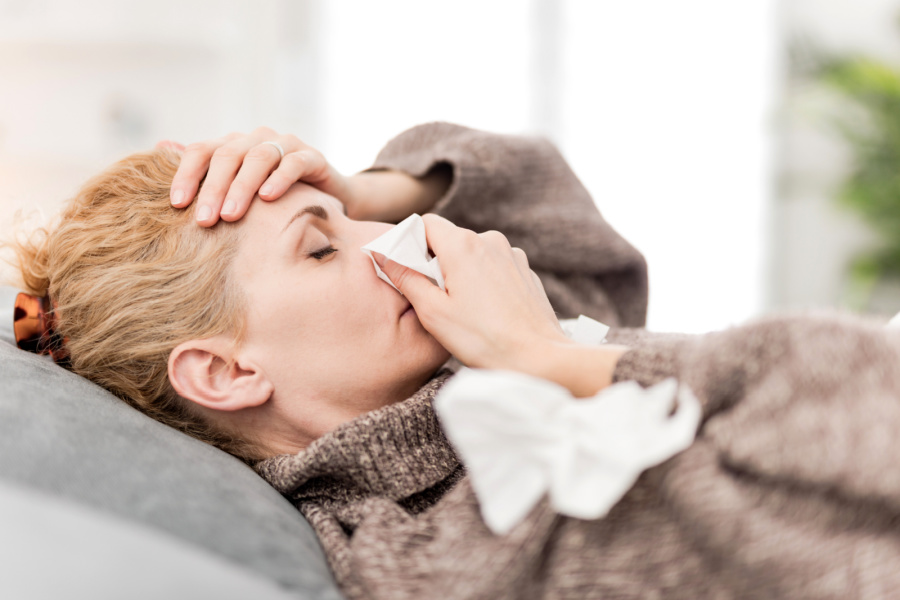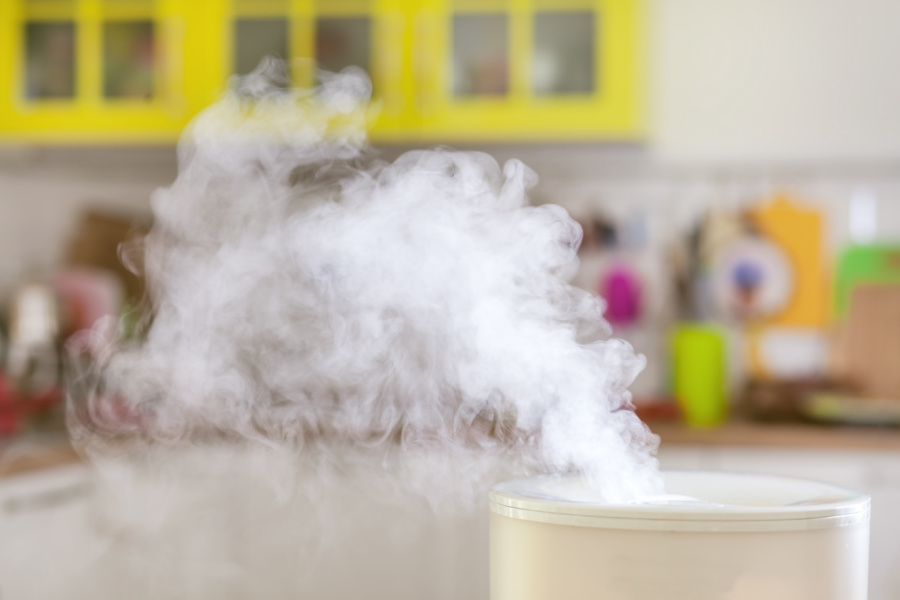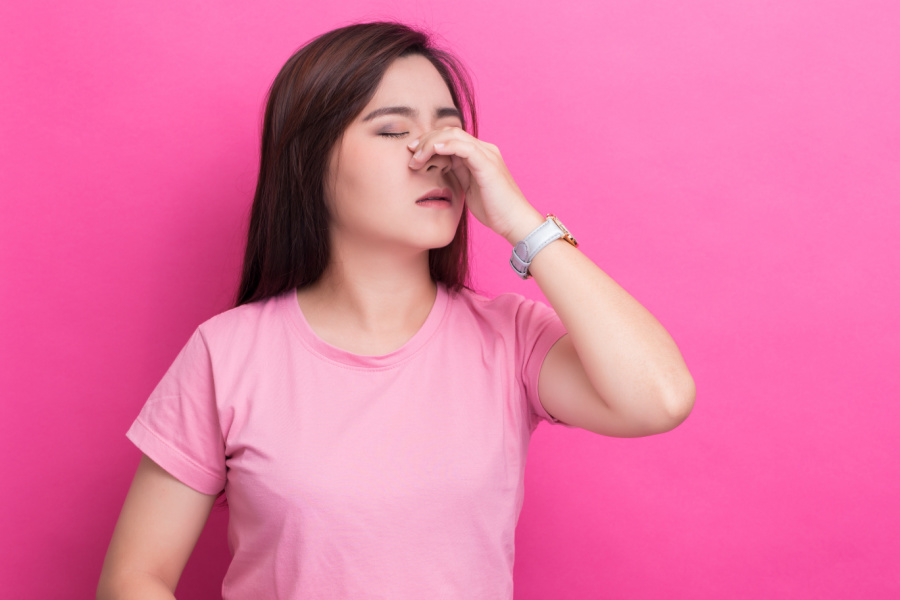You have a stuffy nose, a chronic headache, pressure is building in your forehead, and you don’t feel good? You may be having an acute sinus infection, and you’ll need to deal with it.
Sinus infection, referred to by the medical term acute sinusitis, affects millions of Americans each year, costing them over $1 billion. There are several best ways to treat the debilitating infection, though, whether you prefer home remedies or over-the-counter drugs.
If you’re looking to understand how to get over a sinus infection, keep reading. This post will detail everything about sinus infections, including what they are, how to treat them, and how to prevent them in the first place.

What is a sinus infection?
A sinus is an air-filled nasal cavity present in the facial bones and drains into the nose. They’re present on the cheeks, forehead, and near the eyes.
Sinus infection happens when the sinus gets blocked, and much mucus gets trapped in it. With the nasal discharge trapped in the sinus, bacteria, viruses, or fungi (rarely) grow easily due to the stagnant and moist environment.
Some of the symptoms of sinusitis include:
- Postnasal drip
- Facial pain
- Headache
- Cough or sore throat
- Fever
- Fatigue
- Nasal congestion and obstruction
- Halitosis (bad breath)
A sinus infection may be confused with a common cold based on its symptoms. However, the two infections are different, with the main difference being how long their symptoms linger.
The symptoms of a common cold last no longer than ten days, while chronic sinusitis, a more chronic infection, can stay for about 12 weeks or longer. Also, the common cold produces clear mucus, while sinus infection yields yellow or green mucus.
Types of sinusitis
There are three common types of sinusitis, depending on how long the symptoms last. They are;
- Acute sinusitis; symptoms last for 4 weeks or less
- Subacute sinusitis; sinuses swelling is present for about 1 to 3 months
- Chronic sinusitis; severe cases where sinuses swell for over 3 months
Let’s see how you can get over a sinus infection below:

How can I get rid of the sinus infection fast?
You have to go through your days in pain and fog when you have acute sinusitis. But you shouldn’t have to endure the pain for long, as there are easy ways to get rid of the infection.
Here are ten methods to help ease your sinus pain and inflammation and enable you to get over the acute infections:
Nasal spray
If you have a sinus infection disturbing your peace, over-the-counter nasal sprays may be your answer. If well used, most nasal sprays will minimize swelling in the nasal passages and allow mucus to drain from the sinuses.
However, do not misuse the nasal spray as overuse can result in a rebound phenomenon that makes nasal passages swell and close up. Most nasal decongestant sprays should be used no longer than 3-4 days, but steroid and saline nasal sprays can be used longer.
Also, make sure to read and follow the instructions that come with the spray. If you have underlying medical conditions or are pregnant, you should first consult your physician before using nasal sprays.
Nasal irrigation
Nasal irrigation may also be used to relieve sinus symptoms. A recent study shows that people that use nasal irrigation experience fewer symptoms, fewer sinus headaches, and are less likely to need OTC drugs.
You may use a neti pot, a syringe, or a rinse bottle for nasal irrigation. A neti pot is a small container created to rinse mucus or debris from your nasal cavities.
Neti pot is mainly used to treat nasal allergies symptoms, colds, or sinus problems. However, be careful when using the container, as using it with the wrong type of water can be dangerous.
Avoid using water straight from the tap for nasal irrigation. Unlike the stomach, whose acids kill bacteria and parasites, using tap water in the nasal environment won’t kill these germs and may lead to severe infections.
For safety purposes, the Food and Drug Administration (FDA) advises you to take the following precautions:
- Boil tap water for about 3-5 minutes and leave it to cool before using it
- Store the previously boiled water in a clean container and use it within 24 hours.
- Buy sterile or distilled water to use
- Use a specialized filter to remove water-loving germs
You can also buy nasal irrigation solutions online or from a pharmacy or make one yourself. To make a saline solution for use:
- Put about three tablespoons of iodide-free salt into a clear airtight container, and then add one tablespoon of baking soda
- Add 1 cup of sterile water (8 oz) into the container
- If the resulting saline solution causes a burning or stinging sensation, reduce the amount of salt and baking soda
- If the solution is meant for young children, use ½ tablespoon of the dry mixture and mix it with half a cup of sterile or distilled water (4 oz)
- Use a neti pot or small syringe to apply the solution
Then, to clear your sinuses:
- Get in the shower or hold your head over the sink
- Rotate your head to the right and squeeze the saline solution into the left nostril while breathing through the mouth. The solution should come out from your right nostril
- Turn your head to the left, and repeat the process
- Clean the neti pot using distilled or sterile water and dry it thoroughly
You should replace your irrigation bottles after a few months to avoid the spread of infection-causing bacteria or germs.
Steam inhalation
Although not well supported by evidence, some trials show that steam inhalation can be used to relieve some sinus infection symptoms. To use this method, lean over a bowl of hot water and place a towel over your head.
Then, breathe deeply through your nose for about 10-15 minutes, and repeat this process about 3-4 times per day. To make the process more effective, you may add 1-2 drops of essential oils – like peppermint oil or eucalyptus oil – to the water.
Specifically, eucalyptus oil has antibacterial and anti-inflammatory properties, making it an effective treatment method for sinus rinses. You can purchase this type of oil online or from health food stores.

Rest
This is one of the best natural remedies for sinus infections. It helps your body recover and gives it the energy to fight against viral, bacterial, or fungal infections.
So, stay at home, have plenty of rest, and eat well to help get over the infection faster. This can also help in reducing the spread of viral sinus infections.
East some spices
The Eustachian tube connects your ears, nose, and throat, meaning that what you eat impacts your nasal passages. Eating spicy foods like horseradish, wasabi, hot sauce, or hot peppers can open your sinuses quickly.
However, this response may not last long, especially if you suffer from a bacterial sinus infection. Spicy foods should be your go-to natural remedies if you want relief for a few hours.
Hydration
Drinking plenty of clear fluids has also proved effective in dealing with acute sinus infections. Among the liquids that can help you get over the infection include:
- Plain, clean water
- Hot water with honey, ginger, or lemon
- Broth
- Herbal teas
However, stay away from carbonated drinks like soda when you have sinus.
Over-the-counter medications
Depending on what caused the sinus infection, OTC medications like decongestants and antihistamines can provide you with quick relief. For instance, antihistamines will help you have an allergy, while decongestants will be effective in the case of a bacterial infection.
Other prescription medications, like aspirin and ibuprofen, may be used as pain relievers. They’ll help ease symptoms of a sinus infection like fever, headaches, and localized pain.
Warm compress
Applying a warm compress to your face may also relieve sinus pressure and ease facial pain. To get a warm compress, soak a clean towel in hot water, wring it out and place it on the affected area of the face.

How can I prevent sinus infections?
Centers for Disease Control and Prevention (CDC) states that 9/10 of sinus infections in adults are caused by viruses. This means that the infection is highly contagious.
On the positive end, viral infections can be prevented easily. If allergies or a structural problem doesn’t cause your infection, the following measures can help you prevent it:
- Reduce stress
- Get a yearly flu vaccination
- Avoid people with flu or cold
- Stay hydrated
- Eat an antioxidant-rich diet
If your sinus infection is caused by allergic reactions or reduced immune system, taking vitamin C can help prevent the infection by boosting your immunity.
When do I seek medical care?
According to CDC, you may need medical treatment if you have:
- Recurring sinusitis – it may mean that you have a deviated septum
- Any severe symptoms like facial pain
- An infection that lasts for more than ten days
- High fever lasting 3-4 days
Young children (under three months old) may need to see their healthcare provider immediately after the symptoms appear.
Final thoughts
Sinus infections are common, affecting 31 million Americans each year. The good news is that the signs and symptoms of sinusitis can be eased through several home sinus infection treatments, including nasal irrigation, drinking hot liquids, and eating spicy foods.
This article discusses sinus infection, including what it is, how to prevent it, and the different treatment options. I hope you’ve enjoyed it.
Leave a Reply